Am I Just Losing Water Weight? [+ How To Lose Fat Instead]
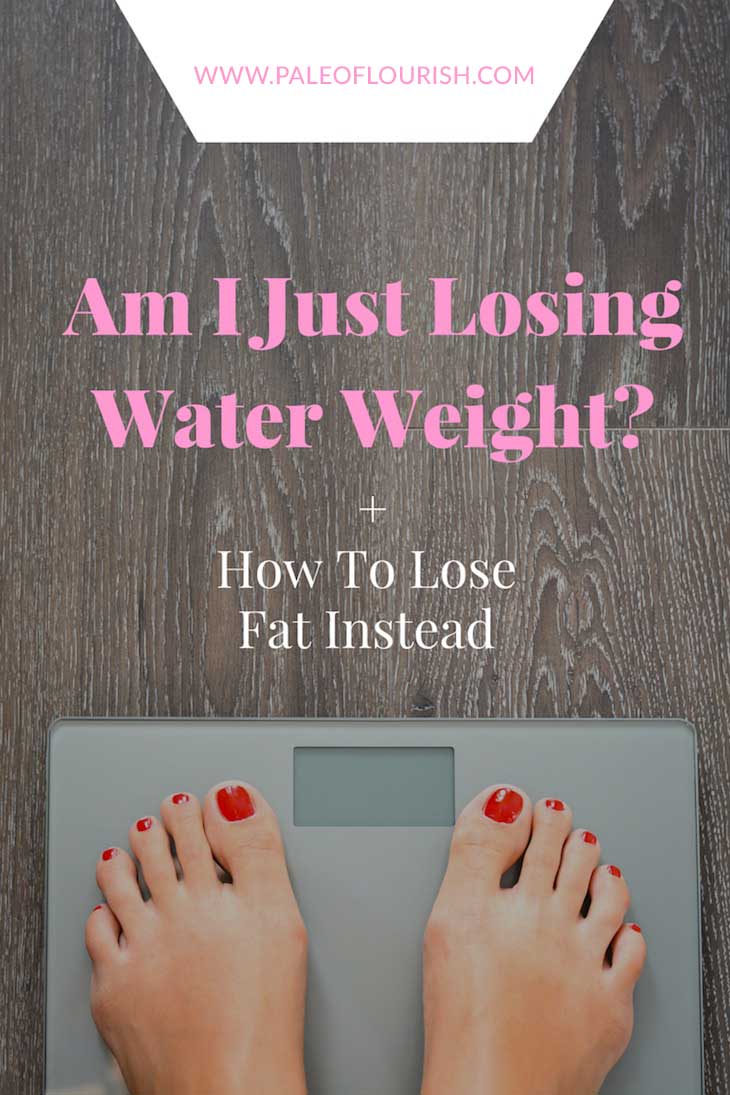
Whenever we start a new diet for weight loss, whether it’s Paleo, keto, low-carb, vegetarian, Mediterranean, or something else, it’s always really exciting when you drop a bunch of weight in the first week of starting the diet. But are you actually losing fat, or is it just water weight that you’re dropping?
In this post, I’ll explain what is water weight, what causes water retention in your body, ways to check if you’re just losing water weight, and how you can start actually losing fat rather than just water.
Check out our table of contents below if you want to jump straight to a section.
Table of Contents – Am I Just Losing Water Weight?
- What Is Water Weight?
- 5 Reasons For Water Retention
- Am I Just Losing Water Weight When I Go Paleo, Keto, or Low-Carb?
- Why Carbs Make You Store More Water?
- 4 Ways To Know Whether You’re Losing Fat or Just Water
- 3 Ways To Actually Lose Fat Rather Than Water Weight
What Is Water Weight?
Water weight is exactly what it sounds like…extra weight that you’re carrying around due to excess water retention in your body.
In general, most human adults are around 65% water weight, which means that you’re mostly water!
The amount of water our body retains can change with a variety of factors (including age – older people tend to retain less water). For women, being on your period can often cause you to significantly retain more water!
What Causes Water Retention?
If you’re retaining more water than your body needs, then that simply means there’s more water molecules in between your cells (also called extracellular fluid) or sometimes inside your cells too, and it’s causing you to feel uncomfortable.
This phenomena is often called bloating, and it can result in puffy ankles, fingers and toes, as well as when your weight jumps 0.5-4 lbs overnight.
Gaining water weight is definitely not a pleasant sensation – you feel big, your clothes feel tight, and you’re wondering what the heck happened.
There are various reasons why you might be retaining more water. Here are some of the top reasons.
5 Reasons For Water Retention
We’ve created a simple infographic to illustrate the 5 reasons why you might be retaining water. Feel free to pin this image or share it.
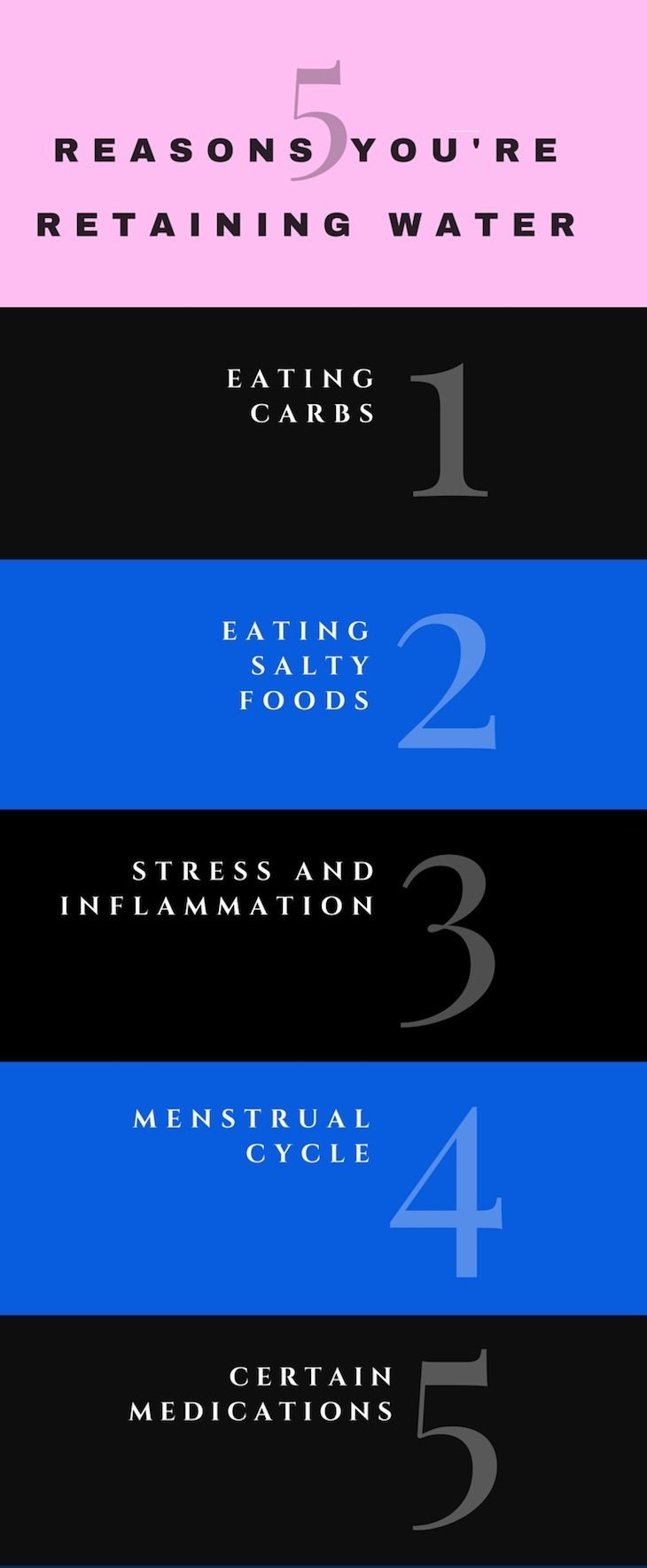
-
EATING CARBOHYDRATES
As explained in quite a lot of detail below, if you eat lots of carbohydrates, then your body often stores the excess amounts in a form called glycogen. And glycogen loves water, and so it binds to a lot of water molecules, which means you end up retaining more water in your body.
That’s why if you typically eat a Paleo, Keto, or otherwise low-carb diet, and you go and eat a cheat meal one day, you’ll find you gained 1-2 lbs in the morning! That extra weight gain is NOT fat – it’s water.
If you’re eating a Paleo diet and still feel bloated, then it could be one of the other reasons on this list or you could be eating too much high carbohydrates Paleo food (like sweet potatoes and Paleo treats).
SOLUTION
Focus on eating more green leafy vegetables, drinking more water, and eating fish and meats rather than foods high in carbs.
-
EATING SALTY FOODS
Many of the processes in our body are in a delicate balance. And the concentration of salts (like sodium and potassium salts) outside and inside our cells is something that’s regulated very closely. So, when you take in more table salt in your food, which is mostly sodium chloride, your body has to either get rid of that extra sodium or else take in more water to keep the concentration of your body fluids the same. That’s why you often get so thirsty after you eat a salty meal.
If you drink more water, you can actually help your body get rid of that extra sodium you took in and thereby help you retain less water!
SOLUTION
Eat less processed foods and drink more water. If you’re eating very little processed foods already, then you should have removed most sources of sodium in your diet. Drinking more water can help balance your salt levels as well.
-
STRESS AND INFLAMMATION
As this paper suggests, there’s a link between water retention and inflammation. There are many hormones at play in our body that regulate our water and salt levels, and several of the ones that become activated in times of chronic inflammation and stress are the ones that help you retain more water. In particular, high levels of cortisol, which often gets elevated when you’re stressed, can cause you to retain more water and salt.
While, there isn’t a strong correlation between stress and water retention, the fact remains that being under low levels of stress all the time is just unhealthy on so many fronts.
SOLUTION
De-stressing requires some commitment upfront from you. Taking more time off for yourself, meditation, and getting exercise can all help.
-
MENSTRUAL CYCLE
For women, hormonal changes during the menstrual cycle can cause severe water retention (as much as 2-5 lbs of water weight!). Most of the water retention occurs the week before the periods actually start, although for some women water retention can start before then.
SOLUTION
Drinking plenty of water the weeks before your period starts as well as taking in plenty of minerals like magnesium and potassium can help.
-
CERTAIN MEDICATIONS
As you can imagine, many medications that causes changes in your hormones could cause you to retain more water. In particular, people find that birth control pills (especially ones that are high in estrogen) and anti-depressants can cause you to retain more water.
SOLUTION
Talk to your doctor to see if there are alternatives to any medications you may be on that’s causing you to retain water.
Or, if you prefer learning things via videos, then here’s a quick 2-minute video showing you this information.
For sudden or excessive water retention issues, please see your doctor as it could be a sign of a more serious health issue.
Am I Just Losing Water Weight When I Go Paleo, Keto, or Low-Carb?
If you read some of the diet forums, then when an excited dieter talks about how they lost 4lbs in their first week of a diet, most of the other forum members quickly comment to let them know that it was probably not “real weight” but was just water weight instead.
Is this true? Is it just water weight you’re losing?
- If you lose a lot of weight in the first week after cutting out a lot of carbohydrates, then most of that weight is probably water weight you’ve lost.
- You probably also lost some fat (and/or muscle) during that first week along with water.
- Weight you lose after that first (or second) week is probably fat (and/or muscle)
But, don’t look so glum. That water weight is still weight that’s preventing you from looking and feeling your best, and it does mean that you’re starting to become less dependent on carbohydrates! As this Reddit member puts it:
“Less bloated, clothes comfier. I say yay for ditching the water weight!”
If you’re interested in the science behind all of this, then I’ve included a more in-depth section below in the grey box about why eating more carbohydrates cause you to retain more water (and conversely why you lose a lot of water weight when you first go on a low-carbohydrate diet).
Why Carbs Make You Store More Water?
The glucose levels in your blood must be maintained between a very narrow range for your body to function correctly. And you typically feed it that glucose by eating a ton of carbohydrates (like potato chips, bread, sugar). However, there will be times (e.g., when you’re asleep) when you stop intaking glucose but your body still needs to keep glucose at that same level.
Over the millennia, your body has figured out a way of dealing with this, which is to store that excess glucose you take in daily as glycogen (which is mostly stored in your liver). That way, when your blood glucose levels drop, your brain sends a signal saying “hey, we’re starving up here, go make some glucose from all that glycogen you have down there.”
This process of creating new glucose molecules from your glycogen stores is what’s called glycogenolysis. When you eat excess glucose, your body turns that glucose into glycogen and that process is called glycogenesis.
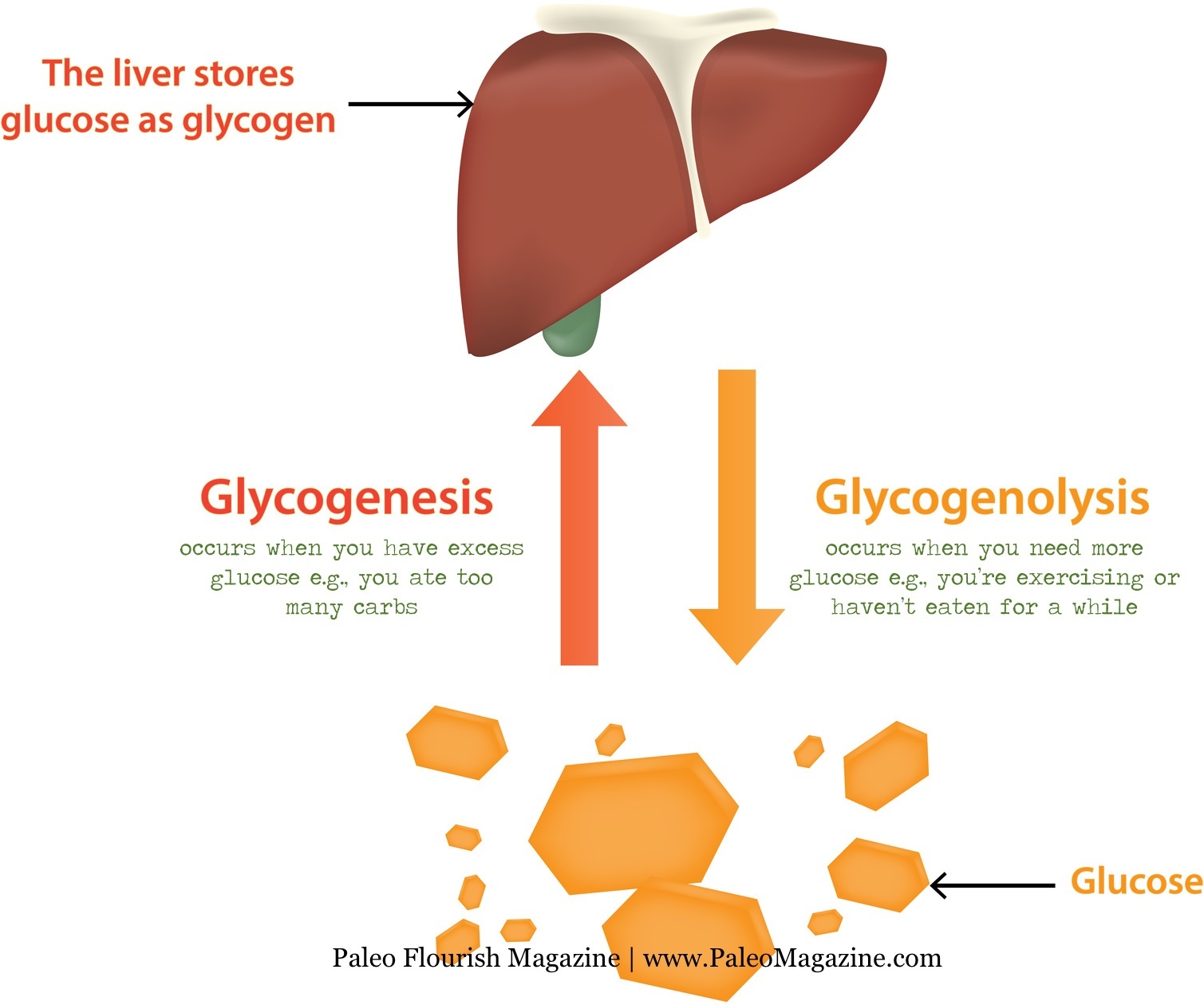
As a side note, you might hear hard core crossfitters or other exercise buffs talk about “depleting their glycogen stores” – what that means is that while they were exercising, their bodies used up all the glucose that was in their blood, and then their brain said “hey, create more glucose from glycogen” and then they used up all their glycogen by converting it to glucose. At that point, they can experience extreme exhaustion.
Of course, our human bodies have figured out a good way of dealing with glycogen depletion too (because it’s important to make sure you supply your brain with that 100 grams of glucose daily!). So, we can create glucose out of protein and we also have another energy source (ketones) that’s produced when you’re in ketosis. For people who are not so dependent on carbohydrates for their energy, they can switch over to burning ketones instead of glucose very quickly and painlessly, and hence why there’s been a lot of press about athletes doing really well on a ketogenic diet.
Going back to the whole issue of water…when your body has lots of stored glycogen (which typically results from you having eaten an excess of carbohydrates), then you usually retain more water. This is because each glycogen molecule is often bound to several water molecules.
If you’re into the chemistry of it all, then take a look at part of the glycogen molecule depicted below.
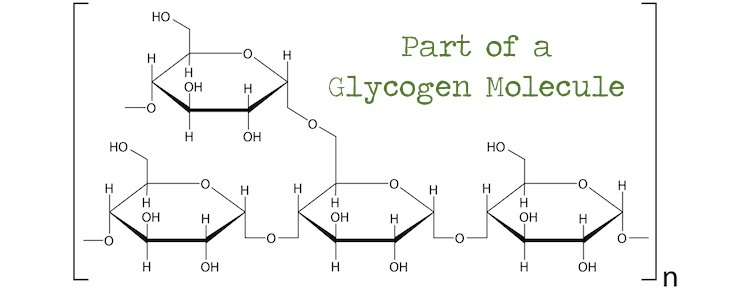
You’ll notice that water (H2O) is not drawn attached to the molecule. So, what I mean when I say that water molecules are bound to the glycogen is that glycogen is very hydrophilic (i.e., it LOVES water and it literally attracts water molecules), and you can tell this because it has a bunch of OH groups attached to the ends of glycogen. These OH groups are what attracts water molecules and what causes water retention.
However, when you start eating fewer carbohydrates (e.g., on a Paleo, Ketogenic, or Low-Carb diet), you use up the glucose in your blood stream (because you have very little of it), and then you start to use up the glycogen stored in your liver and muscles. When that glycogen is converted into glucose through gluconeogenesis, all those water molecules that the glycogen was bound to gets released. And so your body loses that extra water weight.
And that’s the brief story of why you lose a lot of water weight when you first go on a low carbohydrate diet.
S
C
I
E
N
C
E
A
L
E
R
T
S
C
I
E
N
C
E
A
L
E
R
T
S
C
I
E
N
C
E
A
L
E
R
T
4 Ways To Know Whether You’re Losing Fat or Just Water
Here’s another infographic for you to pin and share. It illustrates the 4 ways described below to tell whether you’re losing fat or just water.
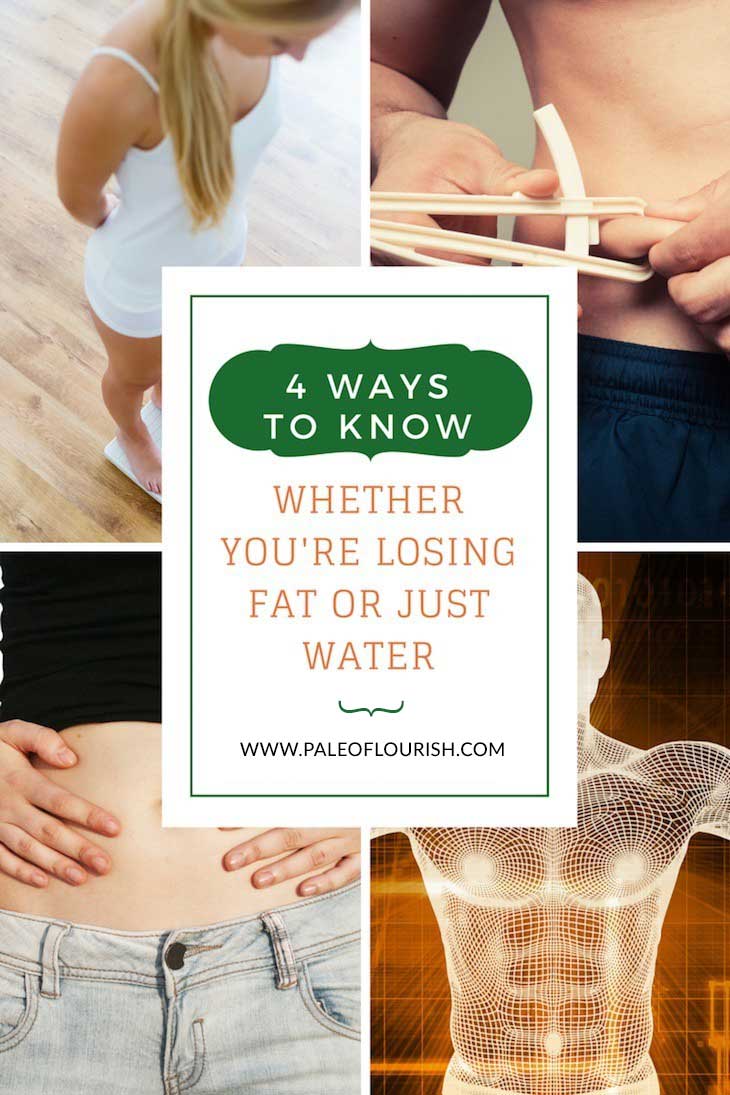
-
YOU DROP A LOT OF WEIGHT IN THE FIRST WEEK OF CUTTING CARBS
This is probably one of the easiest ways to know whether you’re losing a lot of water weight. If you go on a low carb diet like Paleo, Keto, Atkins, and you find that you lose more than 2 lbs of body weight in the first week, then a lot of that weight loss is probably due to water weight loss. Of course, some of the weight loss can also be due to fat loss (and/or loss of muscle weight), so don’t despair!
The best way is to wait until the second and third weeks and then see how much additional weight you lose. And like I mentioned above, losing water weight is still good! It can help you fit into your clothes better and move around more easily. And these changes can help motivate you to exercise more and stick to a healthy diet for longer.
-
USE CALIPERS TO MEASURE FAT LOSS
Using calipers to measure how much skin and fat you have in different parts of your body can actually be quite accurate at determining whether you lost actual fat or if you lost just water weight. However, most people use calipers incorrectly and therefore this method often leads to inaccurate results for people.
To use calipers, you would need to take measurements before you start your diet, and then take measurements at regular intervals to see how much you’re losing.
-
DO YOU FEEL LESS PUFFY?
While this is not a very scientific method, it can be a quick and easy indicator of whether you’ve lost significant water weight especially when combined method #1 above (i.e., if you also lost a significant amount of weight in the first week after cutting most carbohydrates from your diet).
-
DEXA SCANS
DEXA scans are often used to measure your bone density, but it’s also a great measurement of body fat percentage. So, if you’re planning to go on a strict dietary change, then going for a DEXA scan first can give you an accurate picture of what you body looks like now so you can compare it 3 months later with another scan to see how far you have actually come along. In particular, it’ll tell you whether you lost fat, water, or muscle and from what parts of your body!
3 Ways To Actually Lose Fat Rather Than Water Weight
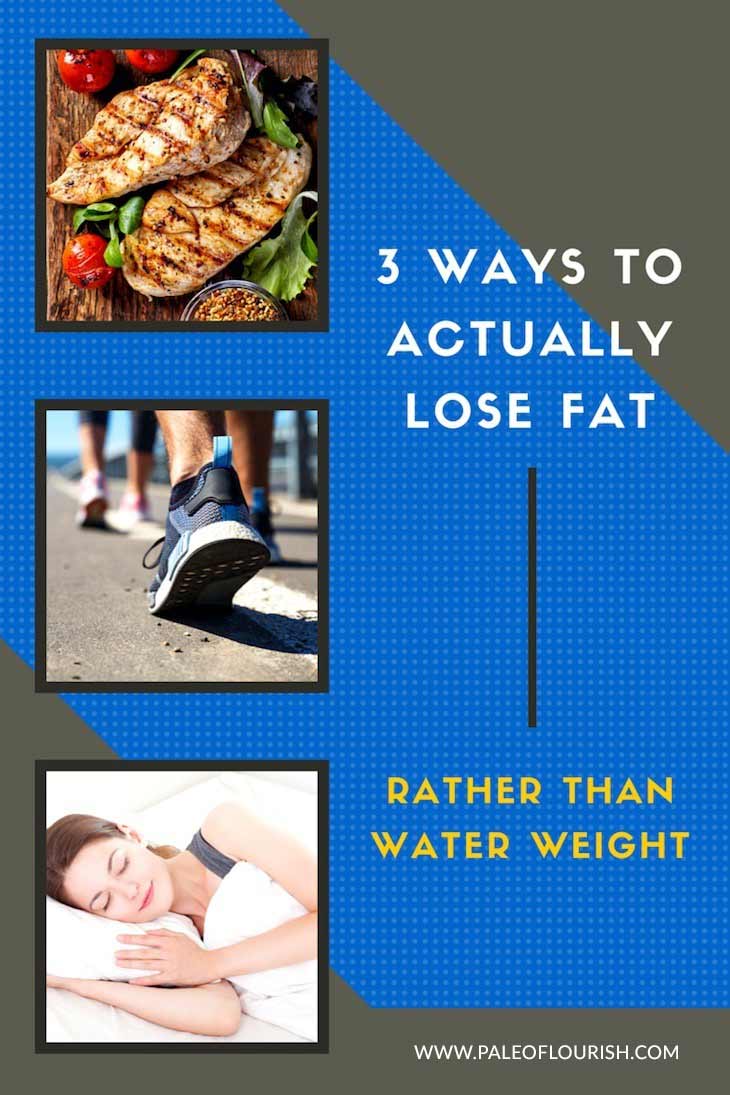
-
- Eat a cleaner diet
EAT A CLEANER DIET
A diet like Paleo or Keto where you eat more high-nutrient foods that are also less inflammatory to your body often helps you feel full for longer so you end up naturally eating less. This helps you lose weight, keep it off, and not ruin your health through chronic inflammation and mineral and vitamin deficiencies.
If you’re just starting a Paleo, Keto, or other low-carb diet, then you might be losing water weight at first, but most people find that their weight and fat continues to drop as they stay with the diet.
If you’re interested in trying a Paleo diet, then you can join our Free 7-day Paleo Challenge here.
-
- Move more
MOVE MORE
-
- Sleep more
SLEEP MORE
There’s no magic to weight-loss unfortunately, and while there are some small things you can tweak to make it go faster or more smoothly, in the end, a healthy lifestyle is what’s going to get you there and help you to keep the weight off.
If you just want to find out more about Paleo, check out our Free Paleo 101 guide here.
Images: Copyright (c) joshya, nenetus, LoloStock, adrian_ilie825, cocolima, kentoh, PointImages, Ana Blazic Pavlovic and logos2012 from Fotolia

